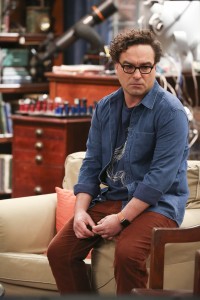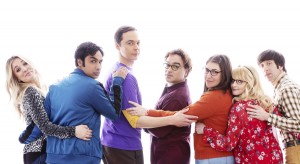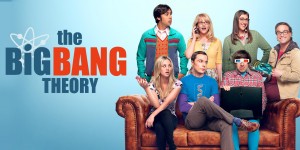On February 7, 2019, THE BIG BANG THEORY became only the fifth production ever to have a soundstage renamed for it on the Warner Brothers lot. This is to memorialize the fact that the CBS hit, now on Thursday nights, has shot on the former Stage 25 for twelve years and almost 300 episodes.
THE BIG BANG THEORY follows the doings of four young, idiosyncratic scientists – Leonard (Johnny Galecki), Sheldon (Jim Parsons), Wolowitz (Simon Helberg), and Koothrappali (Kunal Nayyar) – as well as the women in their lives, Penny (Kaley Cuoco), Amy (Mayim Bialik), and Bernadette (Melissa Rauch). It has won numerous Emmy Awards, and been nominated for many more. It is now building up to its series finale on May 16.
Chuck Lorre and Bill Prady created THE BIG BANG THEORY together and continue to serve as executive producers. Both men, along with the entire cast, are present for the soundstage renaming ceremony. Following this, everybody breaks into small discussion groups.
Prady talks about the essence of THE BIG BANG THEORY, and the kind of series finale he’d prefer – and why that may not be the way the show ends.
ASSIGNMENT X: How many of the big developments – like the addition of the Amy and Bernadette characters – did you plan in advance?
BILL PRADY: Chuck had always insisted on not doing that, on not arcing stories, on not planning ahead. And so every question about, “Did you plan when you added, when you thought to add,” all of that, the answer is no. Everything from adding characters, which was never planned, it was just, well, it would be logical that we would see that person again. The characters added themselves by virtue of what the other characters thought of them. So there was never a master plan, there was never a design, there was never a decision to approach a particular demographic. It was always the natural evolution.
You try to make fictional characters real, and in the course of doing that, if you truly listen to characters, and you say, “Well, Sheldon liked [Amy]. Why wouldn’t he want to see her again?” The premise of the arrival of Amy is that Wolowitz and Koothrappali do a perfect online dating profile, and turn up a woman who’s perfect for them. So that’s what we set out to write in that episode. Well, the consequence of creating a person who’s perfect for somebody is, what would be the reason that person wouldn’t want to see her again? So we said, “All right, well, let’s have her come back one more time, and see what happens.” And you go, “Oh, that went well.” And there have also been people where we say, “Oh, that didn’t go well. Those people, they don’t belong together, for whatever reason.” So there was never a plan.

Johnny Galecki in THE BIG BANG THEORY – Season 12 – “The Maternal Conclusion” | ©2019 CBS/Michael Yarish
AX: Did you have any thoughts for maybe little things in the finale, maybe something with the building elevator …?
PRADY: All of the thoughts that we have about things that would happen in the finale, are the exact same thoughts that fans have, because we’re fans. So anything any fan, any website, any “Ten Things That Should Happen in the Finale” click-bait website says, are similar to things we think about, because we like the show. As to whether or not they happen, who knows? And I don’t mean that to be coy. We talk about stuff all the time – “Wouldn’t it be cool if …? Wouldn’t it be fun if …?” And “Oh, my God, we definitely should.” But we will leave this with, at least for me, forty or fifty things that the characters could do that we’ll never see.
AX: Do you listen to things that fans say online in terms of what they want to happen, and do you ever take those wishes into account?
PRADY: I think it’s hard not to be exposed to that these days, because everything is all out there. I don’t think that we’ve ever gone and taken a suggestion deliberately, but there are so many suggestions made that you can probably reverse-engineer it and find a fan suggesting something that was done. But I don’t recall particularly being in a discussion like that.
AX: When in the course of the twelve years of THE BIG BANG THEORY did you realize that this was a huge hit?
PRADY: [joking] A couple weeks ago. [serious] There was a weird thing that happened during Season 1 because of the Writers Guild strike. We did eight episodes, and that’s all we had done, so CBS re-ran them. CBS came back and said, “They’re holding the numbers in the reruns in the third and fourth run of the show.” And at that point you go, “Maybe there’s something to this.” I think there was a solid feeling by Season 3 or Season 4, when you spoke to people, and they knew what you were doing. So definitively, for me, when my mother stopped mangling the name of the show.
AX: What did your mother used to call it?
PRADY: Oh, my God. THE BIG BLOG THEORY was one, because she “knew” it was about the Internet, maybe? So I think that was one. And THE BIG BOYS THEORY.
AX: How long did it take for her to get it right?
PRADY: I think until about third season.

Johnny Galecki, Jim Parsons, Kaley Cuoco, Simon Helberg, Kunal Nayyar, Mayim Bialik and Melissa Rauch in THE BIG BANG THEORY – Season 12 | ©2019 CBS/Nino Muñoz
AX: When did you know, and once you knew, did you do anything to steer into or away from it, the impact you were having on the image of science grad students?
PRADY: I think a thing that happens legitimately when any profession is depicted, there are people who go, “Oh, I didn’t know that’s a thing you could do for a living.” And at some point, probably around Year 5 or 6, there was an article that ran in the press in the United Kingdom, where somebody had decided to study to see if the presence of scientists regularly on television was having an impact on enrollment in the sciences, and the answer was, it was. When L.A. LAW was popular, people become lawyers, although I don’t recall from history if, when Westerns were popular, people became cowboys. I don’t know if it’s a universal thing. You’d have to go back to the 1950s and find out, wouldn’t you? But I do know we made the decision, right from the beginning, that we wanted the science to be right. We wanted the science to be right enough that, if you were a scientist, and you were watching the show, you wouldn’t want to throw your shoes at the television. And I think that the effort to make the science right, and to make it accurate, made the show interesting to people who were doing that.
But I think the greatest impact on that was when Chuck started THE BIG BANG THEORY scholarship. You can look up the statistics, but we put a number of young people through science education at UCLA. So that’s been an incredibly satisfying thing. And the BIG BANG scholars come and visit each year. I will miss that. Among so many things I will miss, I will miss that annual arrival of the BIG BANG THEORY scholars.
AX: You got William Shatner to guest star in an episode this season. How did that come about?
PRADY: It was two things. It was timing, for one, in Bill’s schedule. We had approached him [previously] a couple of times, but they were things that were really cameos. We often think that’s the right way to approach very famous people, is to say, “It’s a quick cameo, we’ll get you in and out in two hours.” And I think after we asked him maybe the second time, he came back and he said, “No, no, I want to come and do a part. I’ll play myself, but I would like to be an important part of a story.” And we went, “Oh! Oh, that’s much better. Let’s do that.” And then it was just a matter of waiting for that story to come along. And so we did Wil Wheaton’s celebrity Dungeons & Dragons game, which in my mind is sort of based on Johnny Carson’s famous poker game that people for years were dying to get into. When we were doing that, we were thinking, “Who’s in this poker game?” There’s a moment in the episode where the guys try to figure out who is in the game, based on who Wil Wheaton knows and all of that. We did the exact same thing that they do in the episode, which is, “Well, who plausibly does Wil Wheaton know?” We said, “Well, he certainly knows someone from STAR TREK. So that’ll be one person.” And then we tried to connect the others.
Bill is one of my favorite people to spend time with. I know him from some stuff earlier, and we’ve spent some time together, but we wound up spending a good chunk of time, and it was really exciting, especially for me, somebody who came home from school – I’m the generation that found STAR TREK in reruns, and that’s an amazing story, how STAR TREK became popular in reruns, how it was a completely dead series, and it found this new life. But for me, as a child, STAR TREK conventions and STAR TREK and all of this was such a phenomenon. To tell another story about my mother, we were not allowed to watch TV, my sister and I, when we came home from school. But we were latchkey kids. My mom worked. So she would come home, and she would feel the top of the television to see if it was warm. So did you figure this out? If you watch the show with a bowl of ice on the top of the television, then you can watch STAR TREK.
AX: There have been some polls that show that THE BIG BANG THEORY is one of the few television series that is almost equally popular with both Democrats and Republicans. Why do you think the series seems to be able to transcend so many cultural divisions?
PRADY: One of the things I think the show does is, it has respect for different points of view, and respects individuality and difference. And our characters don’t talk about politics particularly, but I don’t think that they would agree. We don’t know Sheldon’s politics, but he once said, “When it comes to STAR WARS, I’m more of an Empire man.” So where does he fit on the political spectrum? Where does Penny fit? Where are these characters? We don’t particularly know, but we know they don’t agree. We know that the arguments would be vociferous. And we know that somebody would say, in one of those arguments, “I agree with you, but not for the reason you’re saying.” [laughs] So there would be disagreement among agreement. So I think that the show’s celebration of difference may be why it has such appeal, but I’m going to put that on my website, Thesis Topics for Undergrad Sociologists, because I want the answer. Which I think is going to be a good website.
When Chuck and I were first talking about this, and I was telling him about the guys I knew when I was a computer programmer. And one of the things is, that kind of person was always portrayed homogeneously. And the people who are different in this way, it’s a very heterogeneous group. Once a very famous, very tall supermodel, who came to watch a [taping of a] show. I don’t want to say her name. She said, “I relate to this show, because this was me in high school.” And I’m looking at this supermodel, saying, “How can that be?” And she said, “Well, I was this tall when I was thirteen years old. No one ever asked me out, I didn’t have friends, and I was different.” And then you go, “Oh, okay, yeah, you’re right, you are one of these people. You’re one of our guys.” And I think there’s that – I used to always talk about the Woody Allen movie where you see the two trains passing, STARDUST MEMORIES, and it starts with the two trains, and he sees the other train, and he says life is like there’s something going on [on the other train], and you don’t know how to get there. And I felt that, and I felt that for these characters. And I think that turned out to be the human condition. And maybe that’s it. I don’t know.
AX: How much time do you spend with THE BIG BANG THEORY these days?
PRADY: I’m here every week. I’m here all the time. I participate in the writing of every single episode.
AX: Are you feeling any pressure about the finale?
PRADY: Sure. But you know what? Steve Holland is currently the head writer, so let him feel the pressure.
AX: Is Steve Holland the writer/director formerly known as Savage Steve Holland?
PRADY: No, this is Mild-Mannered Steve Holland. It’s true there are two Steve Hollands – this is the other one.
AX: Have you talked with any of the cast about the ending and what they’d like to see happen in it?
PRADY: We all spend a lot of time together. There are conversations.
AX: Without spoiling the last episode, can you tell us anything about what you’re hoping people will remember?
PRADY: It’s [been] an ongoing discussion in a room with people who have different opinions. I always personally like those endings where you got the sense that you could come back and find those people kind of where they were. But that’s Bill. And there are arguments for all the other wonderful ways to do it.
This interview was conducted during the Winter 2019 Television Critics Association (TCA) press tour.
Related: Interview: YOUNG SHELDON actress Annie Potts chats about Season 1 of THE BIG BANG THEORY spin-off
Follow us on Twitter at ASSIGNMENT X
Like us on Facebook at ASSIGNMENT X
Article Source: Assignment X
Article: Interview: THE BIG BANG THEORY co-creator Bill Prady chats the series finale of the long-running CBS sitcom
Related Posts:












